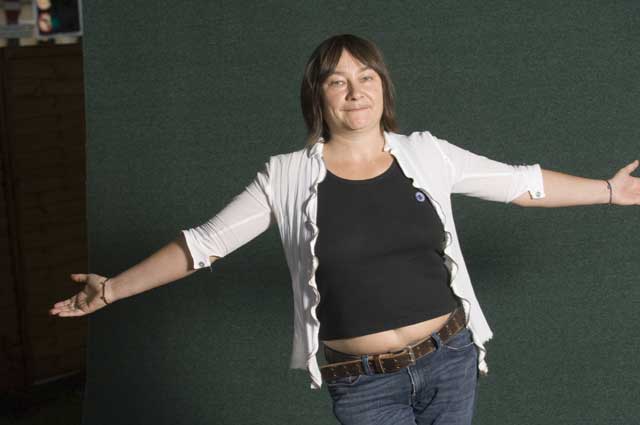There But For The, By Ali Smith

There is usually a moment in an Ali Smith story when I ask myself "where can this strangest of beginnings lead?" and another moment when I think "why is half of this chapter written in parenthesis?"
Then there are other moments when the book stops me in my tracks with its glittering imagination and its warmth, moments when I really do laugh out loud and penny-dropping moments when I turn a page and my eyes fill up.
It happened with Hotel World, The Accidental, and even in the few pages it takes Smith to tell her bizarre, bittersweet short stories. So it happened in There but for the, which has, as usual, a deceptively whimsical scenario as its dramatic pivot: a man – Miles Garth – attends a dinner party and just before the crème brûlée is served, he goes upstairs and barricades himself indefinitely in the host's spare room. "I am only relieved the bedroom is ensuite", says Genevieve Lee, whose bourgeois existence is punctured by the impostor ensconced in her immaculate Greenwich home.
The fascination with language – a central preoccupation in almost all of Smith's stories – is evident here, and much of the playfulness and punning is left to a precocious nine-year-old girl called Brooke. Some might find this linguistic tomfoolery tiring. Yet it is more than simple word play. The semantic and structural disruption, starting with the novel's unfinished title, reflects its anarchic intent – to disrupt the comfortably smug, middle-class sensibility personified by Genevieve and her dinner party set, with their stultifying prejudice and snobbery.
The anti-bourgeois subtext was clear in The Accidental, whose plot revolved around a charismatic, bohemian stranger who inveigled herself into the heart of a middle-class family and stole a lesbian kiss with the mother. Here, Smith sends up the same slice of self-regarding society and interrogates its value system. The dinner party conversation makes for brilliant satire, with secret infidelity, drunken shouting and tears around the table, it's a kind of contemporary Abigail's Party. Genevieve explains how she likes to invite a diverse crowd to her dinner parties: "It's always interesting to branch out. Last year they had invited a Muslim couple; the year before they had had a Palestinian man and his wife and a Jewish doctor and his partner." This year she invited a gay man ("Mark Palmer loves musicals. They tend to, don't they?") and a black couple ("the Bayoudes [had] recently moved here not from anywhere in Africa but from Harrogate").
At points, the book veers into out-and-out social satire, but then Smith steers it back to serious drama. Along with her cleverness and wordy wit, there is a bewitching romanticism to Smith's world, where people truly connect and leave tender imprints on each other. Both she, and they, also tell stories-within-stories. Miles explains the power of storytelling to Brooke: "Think about how a book is on a shelf, he said, just sitting there unopened. Then think what happens when you open it." A lot happens when you open this one.
Join our commenting forum
Join thought-provoking conversations, follow other Independent readers and see their replies
Comments
Bookmark popover
Removed from bookmarks